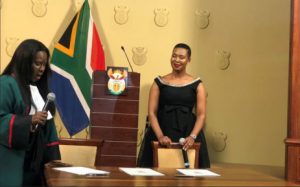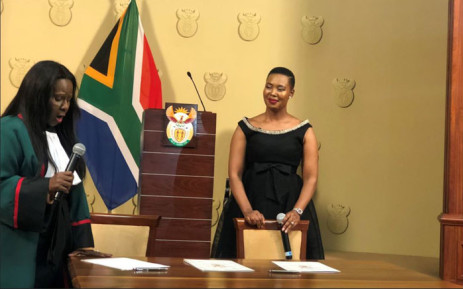
But when Ramaphosa finally addressed the nation just minutes before 16:00, the one name scores of political watchers were hoping to hear did not tumble off his lips.
The president made zero mention of Minister of Women in the Presidency Bathabile Dlamini, who was rocked by several scandals in her term as social development minister, prompting waves of calls for her to be sacked.
“These changes are occasioned by the untimely passing of [former Minister of Water and Environmental Affairs] Edna Molewa and the resignation of Malusi Gigaba and in making these changes I remain determined that the Cabinet of our nation should have an appropriate mix of experience and capability and that it should have members that are committed to serve the needs of our country,” Ramaphosa said at the Union Buildings in Pretoria.
He chose not to fire any Cabinet members despite the Democratic Alliance’s court challenge instructing him to do so. In October, the party approached the high court to force the president to fire Dlamini and Gigaba.
While Gigaba resigned (some say, forcibly) following a series of damaging incidents, including the leaking of a video of a sexual nature and a Public Protector finding that he lied under oath, Dlamini remained defiantly silent in the wake of the court challenge.
So why does Dlamini remain seemingly untouchable?
As we approach elections, the ruling party will head to KwaZulu-Natal for its January 8 statement, where Dlamini – who has close ties to the province and local strong-man Jacob Zuma – enjoys a great amount of support.
Dlamini is the president of the ANC Women’s League, which is a constituency that carries weight within the governing party’s structures.
Dlamini has certainly enjoyed the rub of the green since Ramaphosa first took office in February, with the president’s immediate attention focused on removing other compromised Zuma ministers (including David Mahlobo and Mosebenzi Zwane).
The president may have been hesitant to make too many changes to his Cabinet in less than 12 months, having unexpectedly had to change finance ministers, grappling with death of Edna Molewa (who died in September) and the sudden resignation of Gigaba. Ramaphosa may have felt removing Dlamini now would be one change too many in a short period of time.
However, many analysts believe it’s only a matter of time before Dlamini is ousted from her office in the Presidency, with the 2019 elections earmarked as her moment of reckoning.
Meanwhile, Stella Ndabeni-Abrahams is the new minister of merged Telecommunications and Postal Services and Communications post, reports Sydney Morweng- news editor.
Nomvula “Mama Action” Mokonyane, who headed Communications department, replaces the late Edna Molwena as the minister of Environmental Affairs.
During his announcement, Ramaphosa acknowledged that changes to the Cabinet were guided by gender and the need for a generational mix, indicating that he considered political implications within the ANC.

